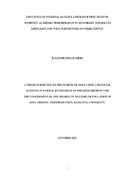| dc.description.abstract | Quality assurance in education is increasingly gaining latitude as evidenced in educational literature and current practices. Apart from ensuring compliance with learners’ requirements, educational policy makers are continually designing and producing tools and models that promote professionalism to check performance that promote quality in schools in a rationalized customer satisfaction manner. This systematic review of education has the ultimate goal of maintaining and improving quality and efficiency. This study evaluated the influences of internal quality assurance practices on students’ academic performance in secondary schools in Kieni East and West Sub-Counties of Kenya. This study was guided by the following objectives: to establish the influence of examining teachers’ professional documents on students’ academic performance; to evaluate the influence of monitoring teaching and learning resources on students’ academic performance; to assess the influence of internal quality assurance feedback on students’ academic performance and to determine the influence of monitoring syllabus coverage on students’ academic performance. The study was guided by Principles of Scientific Management Theory advanced by Fredrick Taylor. The study had a target population of 1004 respondents comprising 56 principals, 944 teachers and four Sub County Quality Assurance Officers. Thirty percent of total population was considered which yielded a sample of 17 principals and 283 teachers. Purposive sampling was used to select four quality assurance officers and school principals while teachers were selected through stratified and simple random. Data was collected using survey questionnaires and interview schedules. Validity of the research instruments was done by seeking expert review from university supervisors. The instruments were piloted for reliability in two secondary schools in neighboring Nyeri Central Sub-county using Test - Retest Method. Both sets of items were correlated using Crobanchs Alpha. A coefficient of ρ>.70 was found in all items and considered reliable. Quantitative data was analyzed by use of both descriptive statistics and inferential statistics. Qualitative data was subjected to content analysis where responses were categorized into common themes related to the objectives of the study. Results obtained showed M>2 in all items of the independent variables meaning that professional documents were rarely examined, instructional resources and syllabus coverage rarely monitored, and feedback rarely given. Relationship among variables described using Pearson correlation coefficients showed high statistical significance (2-tailed), in which all variables indicated significant correlation coefficient p< 0.05 implying a high correlation of quality assurance mechanism in school and its influence on learners’ performance. Qualitative data revealed gaps in quality assurance practices. The study is significant as it provides a theoretical and empirical contribution to the existing literature on internal quality assurance practices in schools’ context. It offers practical recommendations on enhanced responsiveness to continued quality provision for which policy makers and education stakeholders yearn for. The study recommends on building capacity of educational leaders through continuous training to make them more effective in carrying out the quality assurance practices. | en_US |
